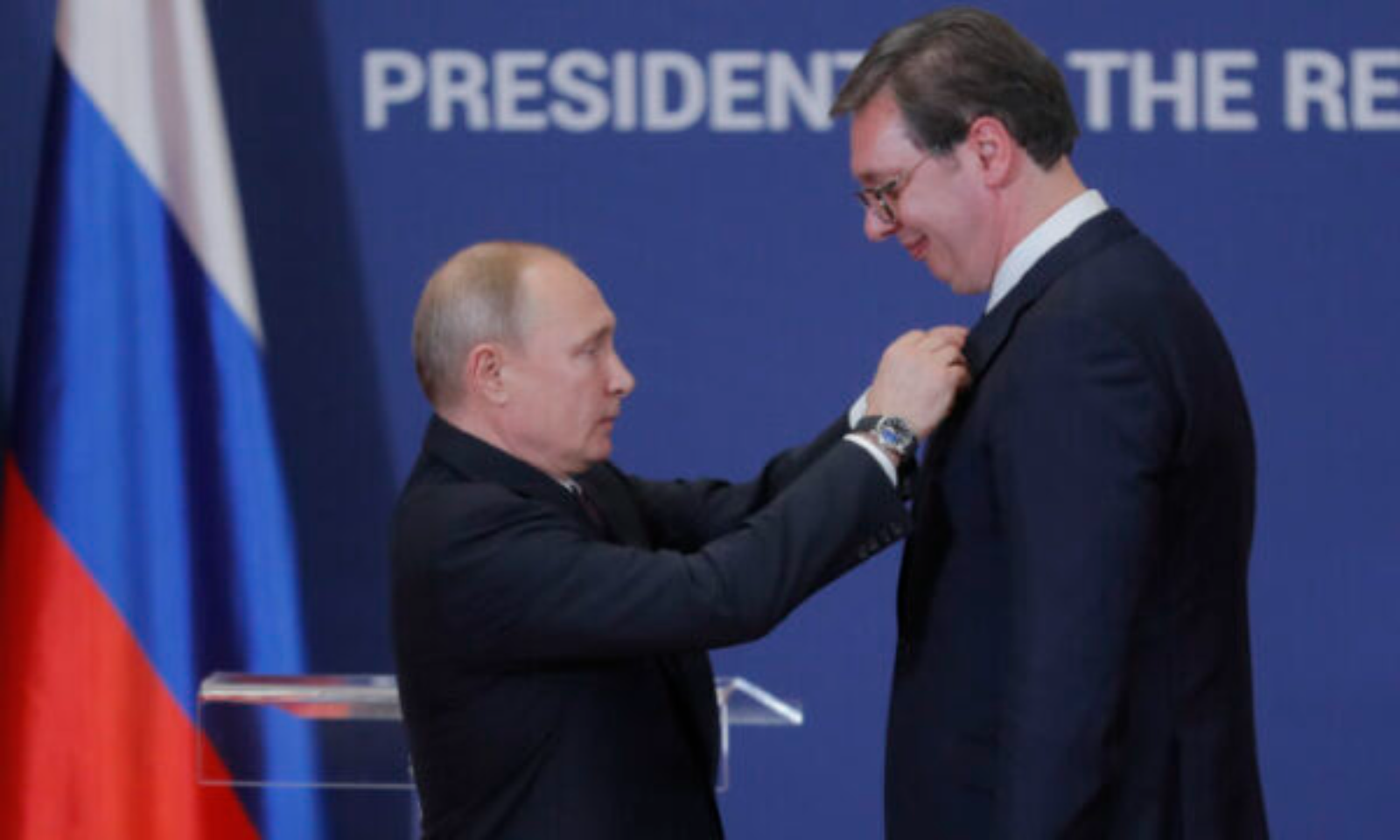The Russian pro-regime newspaper Vzglyad wrote about the latest offer (which has not yet been responded to) from Russian leader Vladimir Putin to Serbian President Aleksandar Vučić for the BRICS summit in Kazan.
On the agenda is the extension of the gas contract, which is extremely beneficial for the citizens of this country, and perhaps something more. Vučić will find it difficult to refuse this offer. But he still does not want to accept it, they say.
Public invitations for foreign leaders to visit Russia in absentia are not accepted in domestic diplomatic practice. The schedules of top officials are complicated, not everything can be planned in advance, and no one wants to justify a possible breakdown, so invitations are usually announced only when all details have already been agreed upon through closed channels. However, Vučić received exactly such an invitation, publicly and in absentia from Putin, after which he took time to consider. And he will consider it for more than a month, this newspaper reminds.
“Greetings to President Vučić. We are expecting him at the BRICS leaders’ summit in Kazan,” said Russian President Putin to Serbian Deputy Prime Minister Aleksandar Vulin, with whom he met on the sidelines of the Eastern Economic Forum.
“We sent him an offer. I hope the president will make use of it,” said Putin.
From this list, they further state:
Thus, the President of Serbia found himself in a situation described by the people with the saying “I want, I need, but mother won’t give it to me,” where ‘mother’ is the collective West, or more concretely, European Commission President Ursula von der Leyen. The fact is that Putin and Vučić have not communicated for more than two and a half years, not even by phone. This is not by chance, nor is it a quarrel, but a consequence of Vučić’s balancing act, who has maneuvered between two fires – Moscow and Brussels – for two and a half years (and in fact much longer). For one reason, but important, he cannot debate with Russia, for other reasons and no less important with the European Union, and what was easy to combine before, cannot now be combined even by such talented skiers as Vučić. But he tries.
They emphasize that, when Western politicians or journalists accuse Vučić of close relations with Russia, he raises his hands and reminds them that he has not spoken to Putin “since the beginning of the large-scale conflict.”
A Scandal Is Inevitable
Formally, the reason for the conversation between the two presidents has become the gas supply contract expiring in March. When it was signed, they received “brotherly” discounts (gas is sold cheaper only in Belarus), they were very happy about this contract and now have the opportunity to extend it.
According to this newspaper, this is not just a visit to Russia but also an invitation to attend the renewed BRICS summit. It is also believed that China, which is gradually becoming the most important investor in Serbia, has participated in this initiative. Beijing has quite significant plans for Serbia as a “support point” in Europe, as it floods the continent with its goods.
In general, it must be accepted. But, on the other hand, the circumstances of Vučić’s invitation and the numerous accompanying reasons did not leave the Serbian president the chance to quietly, without scandal, refuse to visit Kazan. If he refuses the invitation now, a scandal is inevitable; moreover, it will not be just a scandal between Moscow and Belgrade, but within Serbia. Gas prices, connections with Russia, Chinese aid – all this is very important for the Serbs, according to this paper.
However, there is a possibility that Vučić will refuse because, at a certain moment, too many things have been done for Brussels and Washington. There, the very idea of buying gas from Russia and renewing the contract with it is a “taboo topic.” There, in fact, they see the entire BRICS as “an inter-state entity with subtly masked hostility and believe that 45.2 percent of the world’s population is made up of new European democracies (Serbia, Armenia),” says Vzglyad.
Further, they write:
To be fair, there are reasons for concern in Brussels. Russia and China, for various reasons and in different forms, are interested in Serbia due to its geographical position and lithium deposits, which means that BRICS is interested in it, which would benefit from a new member from Europe for regional balance and claims to inclusion. Perhaps after Vladimir Putin’s proposal to discuss gas prices not somewhere, but at the BRICS summit, there is much more hidden – even an alternative geopolitical choice for Belgrade, if the West continues to keep Serbia in the shadows, even without inviting the EU, let alone the G7.
From this paper, they believe that Vučić may fear this the most because it implies a historical choice with consequences and there will be no more opportunity for balancing.
Vučić said he would respond on October 10, while Russia says this pause is “inappropriately long” and concludes:
“Serbs will most likely spend a lot of time not thinking, but bargaining with the West. But a month is so short because we are talking about the fact that Vučić will have to either surpass himself or make a choice that he has long avoided with such talent.”







